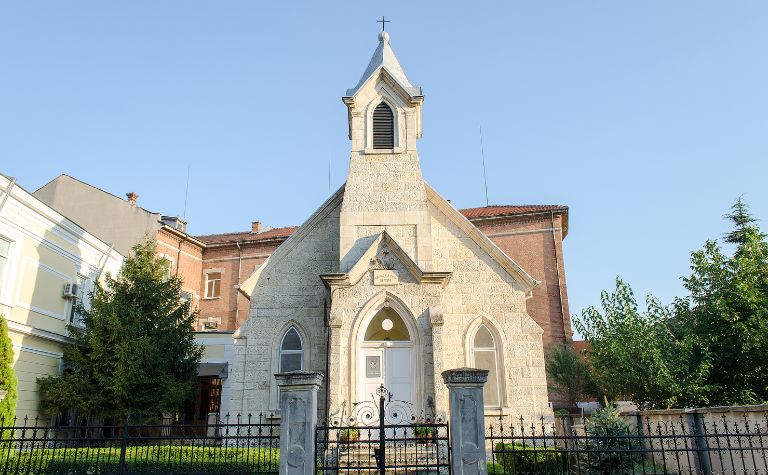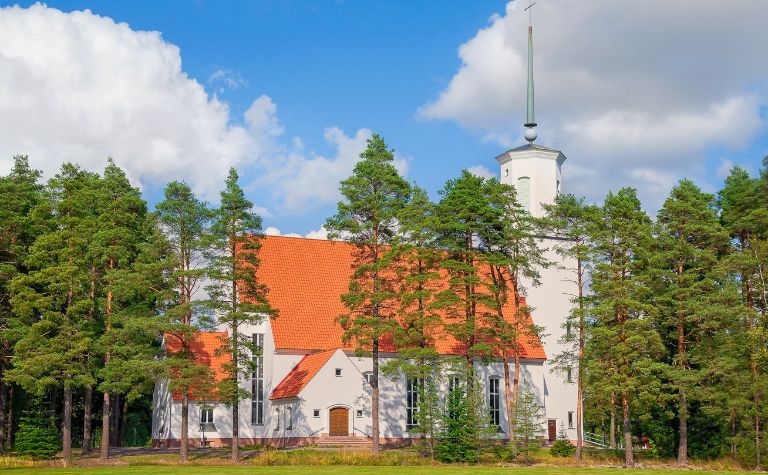Sometimes people name churches in the Lutheran tradition after saints, like “Saint Mark’s Lutheran Church” or “Saint Luke’s Lutheran Church.” Many people know Lutherans don’t have the same view as Roman Catholicism about saints, so why do they name their churches after them?
Some Lutheran churches are named after saints to honor the lives of Christians from the past. In Lutheran teaching, “saint” can be applied to any genuine Christian. Using the term doesn’t mean that any Lutheran church is in theological agreement with the Catholic church on the doctrine.
Why do Lutherans believe the term saints refers to any Christian? What is the difference between the Lutheran and Catholic views on the doctrine? Keep reading to learn more.
Also, see Lutheran vs. Reformed: What’s the Difference? to learn more.

What Do Lutherans Believe About Saints?
Lutheranism believes the term “saints,” as the Bible uses the word, refers to any believer, not just especially revered or influential ones.
In the Old and New Testament, writers use the term to describe God’s people without mentioning any canonization or codification process for sainthood, like in the Catholic church.
Readers find the description Bible verses like:
- Psalm 30:4, “Sing praises to the Lord, O you his saints, and give thanks to his holy name.” (ESV)
- Daniel 7:27, “The greatness of the kingdoms under the whole heaven shall be given to the people of the saints of the Most High.” (ESV)
- Romans 1:7, “To all those in Rome who are loved by God and called to be saints.” (ESV)
- 1 Corinthians 1:2, “To the church of God that is in Corinth, to those sanctified in Christ Jesus, called to be saints…” (ESV)
When a church in the Lutheran tradition names its building after a saint, it reflects how the term is used in Scripture alone and doesn’t suggest that it agrees with the Catholic teaching on the doctrine. (Also see Lutheran Bible vs. Catholic Bible: What’s the Difference?)
Other Protestant traditions also named their churches after saints, including those in the Reformed and Anglican traditions.
However, Baptist, Pentecostal, and non-denominational churches are less likely to name their churches after saints. (Also see Lutheran vs. Episcopalian: What’s the Difference?)
What Is the Literal Meaning of “Saints” In the Bible?
The Lutheran teaching on saints emphasizes that Scripture only uses the term to describe believers in general, not a unique class.
A person doesn’t have to have made a global ministerial impact or have miracles attributed to them to be a saint, according to the Lutheran interpretation of the Bible.
- The Old Testament Hebrew word translated as “saints” refers to people who are faithful and set apart to God: “he pious, godly, those of the people who were faithful, devoted to God’s service.” [1]
- Similarly, the New Testament Greek word often translated as “saints” means holy: “to make holy, consecrate, sanctify; to dedicate, separate” [2]
When either the Old or New Testament uses the word “saints,” it refers to faithful followers of God, most of whom would be considered “regular” or “average.” In the Lutheran tradition, God through Christ makes people saints, not Church leadership. (Also see What Do Lutherans Believe About Mary?)

Does the Lutheran Church Honor Saints?
The Lutheran church honors saints, but not in the same way the Catholic church does. Instead, like other Protestant traditions, Lutheranism remembers the saints to celebrate their devotion and service to God and learn from and emulate their holy lives. (Also see Why Do Lutherans Make the Sign of the Cross?)
The saints of previous generations are essential to Lutherans, but they don’t interact with them, pray for them, or revere them in ways they believe are meant for God alone.
- In Lutheranism, saints “are not mediators of redemption.” Lutheranism teaches that believers, through Jesus Christ, can approach God directly in confession or with prayers of petition.
- In Lutheranism, “prayers to saints are prohibited.” The redemption Christ won through his death and resurrection enabled people to access directly to God. This access doesn’t come from the sinner’s righteousness but from Christ’s. To approach God through other means disregards Christ’s sufficient victory and righteousness. [3]
Lutheranism’s 16th-century Augsburg Confession reads, “Our Confession, however, simply declares that the Scriptures do not teach the invocation of saints, or that we should seek aid at their hands. Now if no command, promise, or example can be produced from the Scriptures to establish this doctrine, it follows that no one can rely on it.”
It continues, “For since every prayer must proceed from faith, how can we know that the invocation of saints is pleasing to God when it is not enjoined upon us in the Word of God? How can we be assured that the saints hear our prayers and the prayers of each one in particular?” [4]
Lutheranism Honors Saints in Three Ways
Lutherans honor saints by thanking God for them. God is the one who called, strengthened, and sustained believers in previous centuries to live holy lives of devotion.
Like believers today, God upheld faithful men and women in the past and ultimately, thanks must go to Him.
Lutherans honor saints by learning from them. People can learn from believers in previous centuries through biographies and literature that they wrote. Christians can read about the lives of people like Martin Luther, Mary the mother of Jesus, John Wesley (who is highly respected in the Lutheran tradition), and many more.
Lutherans can also read the classic works of well-known believers like Augustine’s Confessions or John Calvin’s Institutes of the Christian Religion.
Lutherans honor saints by imitating their faith and other virtues. Christians today can not only learn objective truth from believers in previous centuries, but they can also learn how to live a life that is pleasing to God.
Reading Confessions for example can help a reader understand Christian theology, but it can also inspire them to leave a life of sin and pursue holy living.
The Augsburg Confession reads, “We do not deny in our Confession that the saints should be honored. This may be done in three ways: first, by thanking God for showing us examples of his grace in the lives of the saints, and for supplying the church with teachers and other gifts.”
It continues. “Now as these gifts are great, we should highly esteem them, and praise the saints who made good use of them, as Christ in the Gospel praised the faithful servants, Matt. 25:21,23.” [4]

The Lutheran Calendar of Saints
The Calendar of Saints in the Lutheran tradition organizes the church’s remembrance of believers who lived in previous years.
The church sets apart days for remembering saints for three reasons: thanking, learning, and imitating. Below are examples of the Lutheran Calendar of Saints. (Also see Do Lutherans Celebrate Lent?)
| Date | Saint Honored |
|---|---|
| January 15 | Martin Luther King Jr. (not to be confused with Martin Luther the German Reformer) |
| January 28 | Thomas Aquinas, theologian and philosopher |
| February 18 | Martin Luther, founder of Lutheranism |
| March 2 | John Wesley, founder of Methodism |
| March 17 | Patrick, missionary to Ireland |
| March 22 | Thomas Aquinas, theologian, and philosopher |
| April 9 | Jonathan Edwards, American pastor, and theologian |
| May 27 | John Calvin, French Reformer |
| June 29 | Apostles Peter and Paul |
| August 15 | Mary, mother of Jesus |
| August 28 | Augustine |
| September 29 | Michael, archangel |
| October 4 | Francis of Assisi |
| October 31 | Reformation Day |
| November 1 | All Saints Day |
| November 25 | Isaac Watts, hymn writer |
| December 6 | Nicholas of Myrna (i.e. “Saint Nicholas”) |
| December 19 | Adam and Eve |
| December 26 | Nicholas of Myrna (i.e., “Saint Nicholas”) |
References:
[1] Source
[2] Source
[3] Source
[4] Source
[5] Source
Related Questions
The Lutheran tradition is a 500-year-old branch of Protestant Christianity. Non-denominational churches are a fast-growing segment of evangelical Christianity, especially in the United States and...
Baptist and Lutheran are two of Christian history's most influential Protestant denominations. Yet, while there are many commonalities between Baptist and Lutheran denominations, churches, and...
